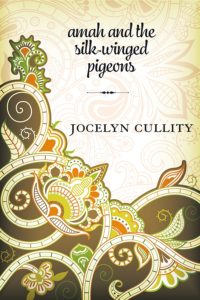Read to the bottom of the page for a special offer!
I have always been fascinated by India… maybe because it is literally as different a culture from ours as possible yet there’s always been cultural cross-over. The British Raj has given us some of the most famous historical fiction ever (you’re a good man, Gunga Din) and yet we in the West have seldom heard the story from the Indians’ perspective. That’s where Jocelyn Cullity and “Amah and the Silk-Winged Pigeons” come in.
Jocelyn Cullity’s Amah & the Silk-Winged Pigeons is based on ten years of research. She was awarded The New England Writer’s Fellowship from A Room of Her Own Foundation in the United States, and a Writers’ Reserve Grant from the Ontario Arts Council in Canada. Her short stories and essays have been published in American, Canadian, and Indian journals and anthologies; her award-winning documentary film about women and social change in China, Going to the Sea, aired on television and in festivals in Canada, the United States, and in Europe.
 Jocelyn has a Ph.D. in Creative Writing from Florida State University and is currently the Director of Creative Writing in the BFA Program at Truman State University. She lives in Columbia, Missouri with her husband, the film scholar Prakash Younger, and their two daughters.
Jocelyn has a Ph.D. in Creative Writing from Florida State University and is currently the Director of Creative Writing in the BFA Program at Truman State University. She lives in Columbia, Missouri with her husband, the film scholar Prakash Younger, and their two daughters.
What’s the story of Amah about?
Amah and the Silk-Winged Pigeons is about the women (who do not find sufficient space or voice in many of our history textbooks) who valiantly resisted English rule in 1857 India — in a famous event that some English called “the Great Mutiny” and what some Indians call “India’s First War of Independence.”
As a Canadian living in the US, I find one of the great ironies is that one person’s “freedom fighter” is another person’s “godless rebel.” What is it about this particular story you found so fascinating?
19th century Lucknow was gorgeous, opulent, and cosmopolitan — European travelers to the city regularly would say they were in “luck. now.” when they reached the city. The English had already taken over other parts of India and in 1856, they deposed Lucknow’s King and began to take over the city. What followed was a famous uprising in which the Indians in the city — led by women — attempted to oust the English.
My mother’s English family lived in India for five generations and my great-great-great aunt was in the city of Lucknow during the resistance to English rule there. When I was a teenager, I transcribed her diary and the event stuck with me! I went on to look at Indian women’s perspectives on the tragedy that happened there. That’s when I found out that it was Indian women who planned and led the resistance — women we know too little about — and I knew then that the story I wanted to tell was theirs.
What’s your favorite scene in the book?

- https://www.amazon.com/s/ref=nb_sb_noss_2?url=search-alias%3Daps&field-keywords=amah+and+the+silk-winged+pigeons
- https://www.amazon.ca/Amah-Silk-Winged-Pigeons-Jocelyn-Cullity/dp/1771334371
